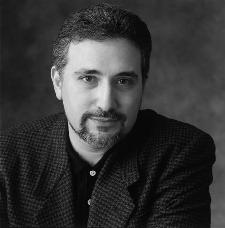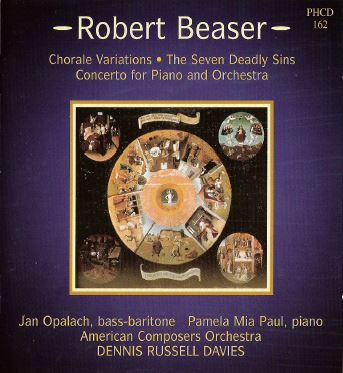
Beaser, Robert
Robert Beaser has emerged as one of the most accomplished creative musicians of his generation. Since 1982, when The New York Times wrote that he possessed a “lyrical gift comparable to that of the late Samuel Barber”, his music has won international acclaim for its balance between dramatic sweep and architectural clarity. He is often cited as an important figure among the New Tonalists – composers who are adapting new tonal grammar to their own uses–and through a wide range of media has established his own language as a synthesis of European tradition and American Vernacular. His recent Opera “The Food of Love”, with a libretto by Terrence McNally, is part of the Central Park Trilogy, which opened to worldwide critical accolades at Glimmerglass and New York City Opera. It was televised nationally on the PBS Great Performances series in January 2000 and received an Emmy nomination for “Outstanding Classical music-dance program”. Beaser’s orchestral CD on London/Argo has garnered considerable attention prompting Gramophone magazine to call his music “Masterly…dazzlingly colorful, fearless of gesture…beautifully fashioned and ingeniously constructed”. The Baltimore Sun writes “Beaser is one of this country’s huge composing talents, with a gift for vocal writing that is perhaps unequaled”.
Born in Boston, Massachusetts in 1954, Beaser studied literature, political philosophy and music at Yale College, graduating summa cum laude, Phi Beta Kappa in 1976. He went on to earn his Master of Music, M.M.A. and Doctor of Musical Arts degrees from the Yale School of Music. His composition teachers have included Jacob Druckman, Earle Brown, Toru Takemitsu, Arnold Franchetti, Yehudi Wyner and Goffredo Petrassi. In addition, he studied conducting with Otto-Werner Mueller, Arthur Weisberg and William Steinberg at Yale, and composition with Betsy Jolas on a Margaret Lee Crofts Fellowship at Tanglewood in 1976. From 1978-1990 he served as co-Music Director and Conductor of the contemporary chamber ensemble Musical Elements at the 92nd street Y, bringing premieres of over two hundred works to New York City. From 1988-1993 he was the Meet The Composer/Composer-in-Residence with the American Composers Orchestra at Carnegie Hall, and served as the ACO’s artistic director until 2001, when he when he assumed the role of Artistic Director. Currently, he is Professor and Chairman of the Composition Department at the Juilliard School in New York.
Beaser’s compositions have earned him numerous awards and honors. At the age of 16, his first orchestral work was performed by the Greater Boston Youth Symphony under his own direction at Jordan Hall in Boston. In 1977 he became the youngest composer to win the Rome Prize from the American Academy in Rome. In 1986, Beaser’s widely heard Mountain Songs was nominated for a Grammy Award in the category of Best Contemporary Composition. He has received fellowships from the Guggenheim and Fulbright Foundations, the National Endowment for the Arts, the Goddard Lieberson Fellowship from the American Academy of Arts and Letters, a Charles Ives Scholarship, an ASCAP Composers Award, a Nonesuch Commission Award and a Barlow Commission. In 1995, when the American Academy of Arts and Letters honored him with their lifetime achievement award, the Academy Award in music they wrote: “His masterful orchestrations, clear-cut structures, and logical musical discourse reveal a musical imagination of rare creativity and sensitivity…and put him in the forefront of his generation of composers.”
Beaser’s music has been performed and commissioned with regularity both in America and abroad. He has received major commissions from the New York Philharmonic (150th anniversary commission), the Chicago Symphony (Centennial commission), the Saint Louis Symphony, The American Composers Orchestra, The Baltimore Symphony and Dawn Upshaw, The American Brass Quintet, Chanticleer, New York City Opera, Glimmerglass, and WNET /Great Performances. Recent major orchestral performances have come from the Chicago, Saint Louis and Baltimore Symphonies, The New York Philharmonic, the American Composers Orchestra, the Marine Band, the Vienna Radio Orchestra, the Linzer Symphony Orchestra, The Krakow Philharmonic, the Dutch Radio Symphony, the Gelders Orchestra, the Hong Kong Philharmonic with James Galway, the Monte Carlo Philharmonic, and the Rome Radio Symphony. Other notable performances include the Phoenix Symphony, the New Orchestra of Westchester, the Delaware Symphony, the Tenerife Symphony, the Charleston, South Bend, and New World Symphonies, the Juilliard Orchestra and the Saint Paul Chamber Orchestra. Chamber performances have been given at the Aspen Ojai, Berlin, Musica di Asolo, Spoleto, and Lockinhaus Festivals, the Festival of Contemporary Music and Rumania, the Brooklyn Academy of Music, Music Today, Musical Elements, the New Juilliard Ensemble, the Seattle and Saint Louis Symphony Chamber Music series, the Chamber Music Societies of Lincoln Center, Baltimore and Chicago, The Twentieth Century Consort, the New York Concert Singers, the New Amsterdam Singers, the San Francisco Contemporary Music Players, the Boston Chamber Players, Continuum, NY Virtuosi, the Bridgehampton Chamber Players, Summergarden at MOMA and the Pittsburgh New Music Ensemble. His music has been performed, recorded and commissioned by artists such as Leonard Slatkin, Paula Robison, Richard Stoltzman, Eliot Fisk, James Galway, Gilbert Levine, Manuel Barrueco, Renee Fleming, Pamela Mia Paul, David Loebel, Lukas Foss, Paul Sperry, Constance Hauman, Alisdair Neale, Stewart Robertson, Big Bird, James Paul, Lauren Flanigan, John Aler, Robert McDuffie, Ransom Wilson, Joel Sachs, Carol Wincenc, Dawn Upshaw, David Zinman, Gerard Schwarz and Dennis Russell Davies.
